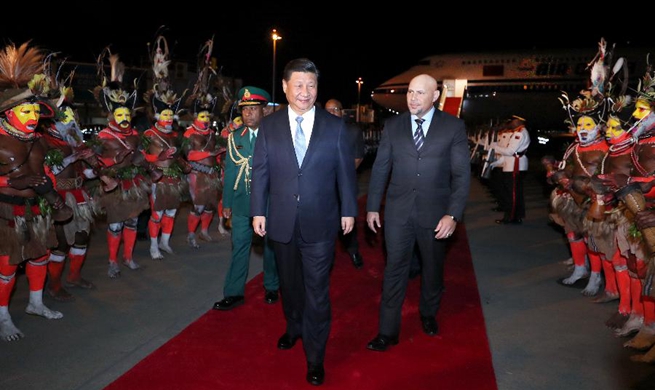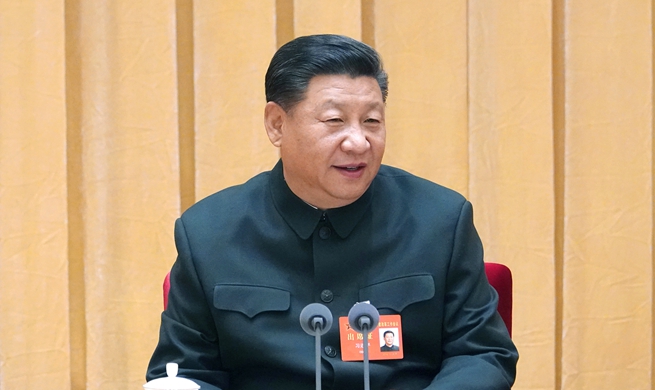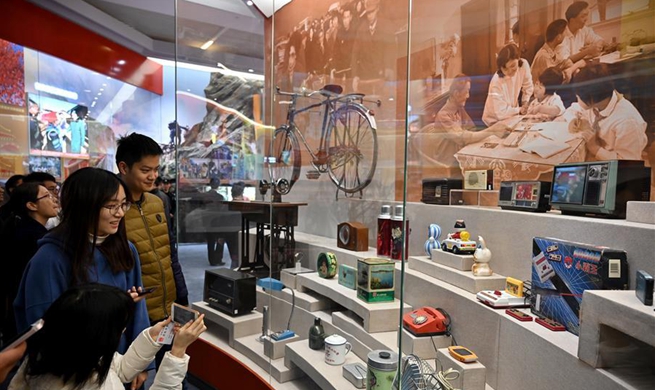BEIJING, Nov. 16 (Xinhua) -- In front of a wall decorated with phonograph records and cassettes in the National Museum of China, 63-year-old Sai Zongming recounts his personal history of listening to music with his family members.
Never having had the chance to own a gramophone -- since it was a luxury for the rich -- Sai used to try every way to listen to his favorite Peking Opera. First, it was TV sets in other people's houses, then it was a radio.
It was only a few years ago that he replaced his radio and cassettes with a speaker that can play thousands of songs using a USB.
Sai, a veteran-turned-farmer from eastern China's Shandong Province, was on a trip to Beijing when he heard about an exhibition to commemorate the 40th anniversary of the reform and opening-up at the country's top museum in central Beijing.
The exhibition has attracted many visitors since it opened on Tuesday. Many people also brought along their children, and it is expected that even more people will attend over the weekend.
"I came here to see the changes that have taken place in the past 40 years, for me as well as for our motherland," he said.
Sai is only one of the hundreds of millions of Chinese whose lives have been changed in the course of four decades of reform and opening-up.
A chart of national economic figures between 1978 and 2017 posted in the exhibition tells it all: gross domestic product has grown from 370 billion yuan (about 53 billion U.S. dollars) to 82.7 trillion yuan, fiscal revenue rising from 110 billion yuan to 17 trillion yuan and the urbanization rate up from 17.92 percent to 58.52 percent.
At the museum, historical photos, texts, videos, miniature models and interactive activities epitomize the changes.
Among the exhibits is an agreement paper signed by 18 farmers in Xiaogang Village to de-collectivize farmland, a business license issued to China's first privately-owned business and the pen used by a Chinese government representative upon China's entry in the World Trade Organization in 2001.
A fashion show was even held inside the museum on Wednesday with models hitting the catwalk with signature dresses from each of the generations over the past four decades, including styles such as an army overcoat and bell-bottomed pants to Western business suits and designer clothes.
Though not everyone was lucky enough to catch the fashion show, they are certain to be awed by the exhibits showing the achievements of the nation and their fellow countrymen in just four decades.
Pride and joy are in the air. The most popular items are hi-tech models demonstrating the country's strength in science. Visitors take a lot of selfies in front of the Tiangong-2 space lab, the deep-sea manned submersible Jiaolong, the Five-hundred-meter Aperture Spherical radio Telescope (FAST) and the Long March series of carrier rockets.
A visitor surnamed Long said she was stunned after seeing the mock-ups of Jiaolong and Tiangong-2.
As a member of Miao ethnic minority, Long said she is proud to see China's great transformation while Miao people's lives improve.
Long runs a tea-leaf business in her hometown in central China. While they had to deal with the muddy road whenever it rained, they now can easily transport agricultural products with small vans running on asphalt roads.
Jiang Shan, a 19-year-old undergraduate in space research from Beihang University, said he was more aware of his responsibility after seeing the exhibition.
"I'm looking forward to China's next step in deep-space exploration now that we have FAST and other related capabilities," said Jiang as he took a picture of the Long March rockets.
















